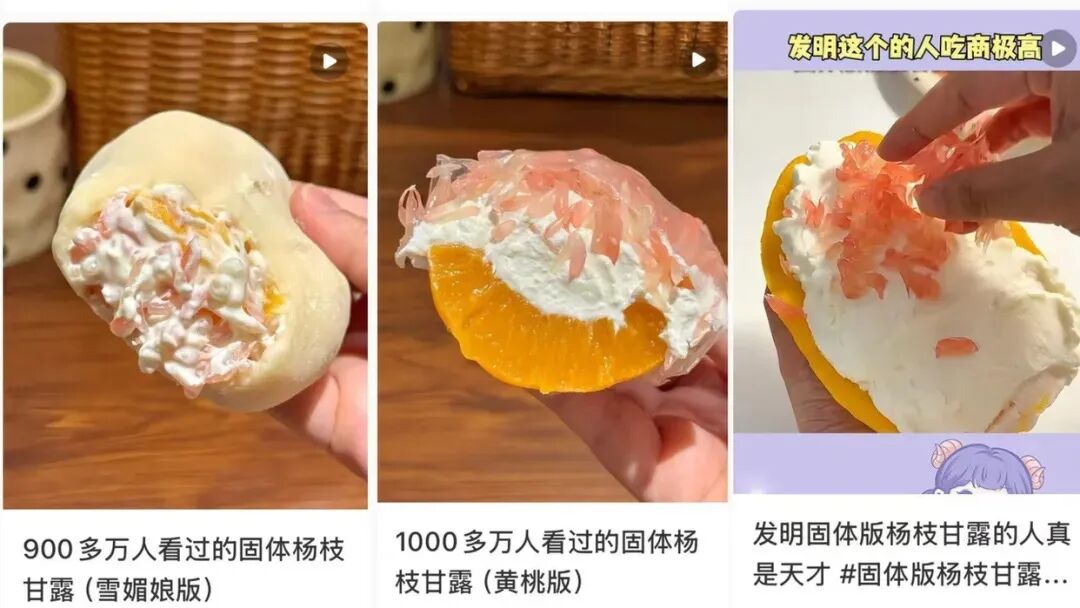近日,一款改良版美食“固体杨枝甘露”在社交平台上火了。

网友在社交平台上分享自制的“固体杨枝甘露”
与传统液态饮品不同,这款创意甜品将芒果泥、西柚果肉与椰浆混合,加入琼脂凝固成块,再配以西米等配料,以其新颖的口感和造型受到不少年轻人喜爱。
A solidified version of yangzhiganlu, or chilled mango sago cream with pomelo, has gone viral on social media platforms in recent days. Unlike its traditional liquid form, this new take mixes mango puree, pomelo pulp, and coconut milk, sets them with agar, and adds sago for texture. Its unique look and taste resonate particularly with younger consumers.
福州一夜市摊主表示“周末是售卖的高峰期,一天可以卖出100多份。”武汉目前也有部分甜品店、果切店跟风上新,外卖平台15-40元的价格区间成为市场主流。

食用“固体杨枝甘露”出现不适?
随着这款美食的流行,也有网友反映,食用后出现了面色发黄、腹泻、腹痛等不适症状,相关话题登上热搜。
However, its popularity has been accompanied by reports from online users of symptoms such as yellowing complexion, diarrhea, and abdominal pain after consumption.




网友评论
“固体杨枝甘露中的西柚、椰浆等食材,在中医理论中都属于寒凉性质,加上需要冷藏食用,更增强了其寒性,容易刺激肠胃。”11月12日,宁波大学附属第一医院消化内科主任医师胡柯峰告诉记者,不同体质的人对寒凉食物的反应各不相同,食用后有人会出现便秘、腹泻、腹痛等症状,这主要是因为固态甜品中的高糖分易吸收肠道内水分,形成较高渗透压,从而影响正常排便,加重消化负担。
Hu Kefeng, a chief gastroenterologist at the First Affiliated Hospital of Ningbo University, stated that the refrigerated cold-nature ingredients, like pomelo and coconut milk, can irritate the stomach. He added that its high sugar content may disrupt bowel movements and increase digestive burden, potentially leading to constipation, diarrhea, or abdominal pain.
浙江省立同德医院中医内科主任周天梅同样表示,过量食用寒凉食物会损伤脾胃功能,而甜腻食物容易生湿生痰,若与寒凉特性相结合,可能导致“寒湿”或“痰湿”体质,进一步影响脾胃健康。
Zhou Tianmei, a director of Internal Medicine of Traditional Chinese Medicine at Tongde Hospital of Zhejiang province, also noted that excessive intake of cold-nature foods can impair the spleen and stomach, while overly sweet and greasy foods tend to generate dampness and phlegm. Combined, they could contribute to cold-damp or phlegm-damp constitutions, further harming digestive health.
医生提醒:这些人群要少吃
上述专家提醒,对于这款甜品,脾胃虚寒者(表现为手脚冰凉、易腹泻)不建议食用;消化功能较弱的儿童和老年人也应尽量少吃。
此外,需特别注意是否对芒果等原料过敏。即便是健康成年人,也应控制食用频率,建议每周不超过1~2次,每次食用量不宜过多。
Experts reminded that this dessert is not recommended for people who often have cold limbs and diarrhea, as well as for children and the elderly with sensitive digestion. Allergies to ingredients like mango should also be considered. Even for healthy adults, it is advisable to limit consumption to no more than once or twice a week in moderation.
“年轻女性日常食用此甜品需注意控制量,若处于经期、孕期及哺乳期等特殊阶段,则不宜食用。”周天梅特别提醒年轻女性群体,“很多女性习惯喝冷饮、吃冰品,长期如此不仅会损伤脾胃,更可能导致体质转向寒凉,继而引发月经量减少、经期推迟或痛经等问题。因此,不仅特殊时期要忌口,日常也要注意,生冷食物尽量少吃。”
Zhou specifically cautioned young women to limit intake and avoid it entirely during menstruation, pregnancy, or breastfeeding. Long-term consumption of cold foods may worsen the constitution and lead to reduced menstrual flow, delays, or pain.
胡柯峰建议,食用固体杨枝甘露后饮用姜汤、红糖姜茶或大麦茶等温热饮品,能中和食物的寒凉特性。当出现轻微胃部不适或腹泻时,应暂停寒凉食物摄入,同时调整饮食结构,多吃温性、易消化的食物,给予肠胃充分恢复时间。
Hu suggested that having a warm drink, such as ginger tea, brown sugar ginger tea, or barley tea, after the dessert can help counteract its cold nature. For mild stomach discomfort or diarrhea, he recommended avoiding cold items and switching to warm, easily digestible foods.
实习生:杨琳
来源:中国青年报 人民日报健康客户端 新华网 湖北日报
|
|
 /1
/1 